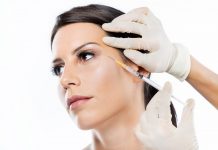Dark spots, or hyperpigmentations, are the annoying pest of the beauty world. They can crop up anywhere on the body, but are especially annoying when they’re right on our faces, where everyone can see them. And what’s worse, we get more and more of them as we age and get more UV exposure, adding to the long list of signs of aging we have to contend with. Did someone say, ‘pass the sunscreen??’
But, have no fear, there’s a great way you can start getting rid of these little lovelies and, even better, you can do it with totally organic skin care products.
Skin has its own, product-free, all natural built-in defenses against UV damage, it’s something most of us don’t even think about. Overproducing melanin, which looks like a nice golden suntan, is one of them. But the problem is, too much anything can be a bad thing, and in this case, it’s caused by UV exposure.
Too much sun can lead to UV damage, or photodamage, and it makes skin cells go a little haywire trying to protect themselves. Instead of a nice golden tan, we get hyperpigmentation and dark spots.
Studies have shown that skin cells overproduce melanin as a response to UVB exposure and researchers have theorized that this is why melanoma (skin cancer) is more common in people who have prolonged exposure to the sun.
The antidote, besides diligently wearing sunscreen every single day, is Vitamin C Serum.
When skin is healthy, happy, and free of damage it has high concentrations of Vitamin C.
This vital nutrient supports the structure of collagen, making skin plump, youthful, and wrinkle-free, while at the same time protects it by finding damaging free radicals and knocking them out. Think of how beautiful, bright, and youthful your skin was in high school. This is your skin’s happy place!
Vitamin C works in 2 major ways to protect and heal skin damage that’s already been done plus it prevents new damage from happening; as a tyrosinase inhibitor and antioxidant..
Vitamin C is a tyrosinase inhibitor. Tyrosinase is an element in plants and animals (like us!) that has a number of important roles. One of the many jobs it has is to help skin cells produce melanin. Since dark spots are an overproduction of melanin, this slows down or even stops the overproduction of melanin and, over time, fades dark spots.
Free radicals are mean little buggers that wreak havoc on cells. They are basically little pieces of oxygen that get loose in the bloodstream when cells are damaged. They float around, happy as they please, knocking into things and end up injuring delicate cells. In skin, free radicals contribute to signs of aging, like fine lines, wrinkles, and loss of elasticity.
But, wait, there is good news.
Antioxidants find and destroy free radicals. You can find antioxidants in lots of things we eat and drink, but vitamin C has been well researched for skin care. It works on the molecular level to find those nasty little free radicals and destroy them, so they can’t cause anymore damage.
So, how do we get enough vitamin C into our dark spotted skin cells to really make a difference?
Sadly, you can’t just eat a ton of oranges every day and expect dark spots to fade. Don’t get me wrong, eating a diet rich in fruits and veggies is absolutely fantastic for your overall health and your skin’s health, but it won’t reach the dark spots. These are living quite happily on your epidermis and are in no danger of getting wiped out by vitamin C you eat (it is quite good for the dermis, though!)
The epidermis is the outermost layer of skin and it’s where dark spots form. The epidermis is fed, if you will, by the layer of skin beneath the epidermis, called the dermis. The dermis houses collagen and elastin, among other things, which give skin its structure, including it’s wrinkles!
The dermis basically passes nutrients through to the epidermis but vitamin C never really reaches these cells in enough quantity to make any difference for dark spots. Scientists think there is a link with the vessels not being able to circulate lots of nutrients across the barrier between the two layers of skin.
This makes applying vitamin C directly to the epidermis a MUST!
It’s the only way to get all the healing, repairing, and protecting effects vitamin C has to offer. The epidermis needs to have vitamin C applied topically to get the dark spot fading effects we are looking for.
We only use organic skin care products, or at least clean and natural skin care products, to avoid adding harmful ingredients into the mix. With prolonged use, things like parabens, BHT and BHA, phthalates, synthetic fragrance, and SLS have been linked to everything from skin irritation, like rashes, to chronic diseases, like cancer. We’d rather just say ‘no.’
Vitamin C serum can make a huge difference in fading dark spots. Science has proven it works to get the job done and finding an organic vitamin C serum will help you avoid adding any extra irritation to your skin.
You Can Also Read : The Top 10 Most Antioxidant Foods































